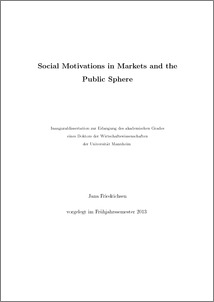|
Social motivations in markets and the public sphere
Friedrichsen, Jana
![[img]](https://madoc.bib.uni-mannheim.de/style/images/fileicons/application_pdf.png)  Vorschau |
|
PDF
DissertationFriedrichsenJ.pdf
- Veröffentlichte Version
Download (1MB)
|
|
URL:
|
https://madoc.bib.uni-mannheim.de/34542
|
|
URN:
|
urn:nbn:de:bsz:180-madoc-345427
|
|
Dokumenttyp:
|
Dissertation
|
|
Erscheinungsjahr:
|
2013
|
|
Ort der Veröffentlichung:
|
Mannheim
|
|
Hochschule:
|
Universität Mannheim
|
|
Gutachter:
|
Grüner, Hans Peter
|
|
Datum der mündl. Prüfung:
|
12 September 2013
|
|
Sprache der Veröffentlichung:
|
Englisch
|
|
Einrichtung:
|
Fakultät für Rechtswissenschaft und Volkswirtschaftslehre > VWL, Wirtschaftspolitik (Grüner 1999-)
Außerfakultäre Einrichtungen > GESS - CDSE (VWL)
|
|
Fachgebiet:
|
330 Wirtschaft
|
|
Normierte Schlagwörter (SWD):
|
Fremdbild , Netzwerk , Produktpositionierung , Industrieökonomie , Politische Ökonomie
|
|
Freie Schlagwörter (Englisch):
|
image motivation , conspicuous consumption , ethical consumption , network effects , persuasive advertising , satisfaction with democracy , industrial organization , political economy
|
|
Abstract:
|
This thesis comprises three self-contained papers that investigare the role of social motivations in markets and political views. In Chapter 2, I set up a theoretical model to analyze the implications of image concerns in strategic market interactions. The novelty in this chapter is to allow for heterogeneity in image concerns. Doing so turns the problem into a two-dimensional screening problem and reveals interesting insights into the incentives for a producer to offer product menus which induce different consumer types to pool by buying identical products. In Chapter 3, I analyze theoretically how two platforms compete by simultaneously choosing investments when network size and investment level are complements in members' utility. I assume that platforms are imperfect substitutes for parts of the population whereas others are ex ante indifferent. I find that the platform which is ex ante favored by fewer individuals than its competitor is more likely to capture the entire market. Chapter 4 is joint work with Philipp Zahn. We empirically analyze political support in Europe and how it relates to economic performance. We find that citizens evaluate their political system more favorably the better the economy performs even when we control for individual characteristics. Furthermore, we do not find significant differences in how individuals react to changes in unemployment and growth rates when comparing individuals who are supposedly affected differently by these changes suggesting a role of social considerations for political support.
|
 | Dieser Eintrag ist Teil der Universitätsbibliographie. |
 | Das Dokument wird vom Publikationsserver der Universitätsbibliothek Mannheim bereitgestellt. |
 Suche Autoren in Suche Autoren in
Sie haben einen Fehler gefunden? Teilen Sie uns Ihren Korrekturwunsch bitte hier mit: E-Mail
Actions (login required)
 |
Eintrag anzeigen |
|
|
